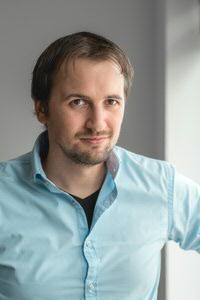Ambition can be a pitfall for young workers
Increasing numbers of young people in employment suffer from stress. PhD student Joost van de Brake (30) advises employers to shelter their young employees in their first years at a company. Don’t let them work on all manner of projects straight away, even though this is customary nowadays and the employees themselves are eager to do so.

The hard drive that he uses is extra secure, his computer has no internet connection and all personal data has been anonymized. To perform his research, Joost van de Brake must follow a strict protocol. ‘Super confidential’ is what he calls the information that he collects for his research into human behaviour in the workplace. He uses information such as the performance appraisals of individual employees by their bosses as well as surveys completed by these same employees about their impressions of the workplace.
Multiple Team Membership: working in more than one team at the same time. This everyday workplace phenomenon is the focus of Van de Brake’s PhD research. It has become the norm in big companies and the public sector. From the data that he has collected, Van de Brake can see that it has advantages and disadvantages. Young employees have particular difficulty with it. The consequence is unhealthy levels of stress and sick leave.
Predicting sick leave
‘If you have to deal with multiple projects at a time, you are faced with many different expectations, multiple clients, multiple project leaders and lots of colleagues,’ he explains. ‘This makes the work very complex. We see that people with little work experience, young people therefore, are less able to deal with this than people with above-average work experience. For the latter it is actually a positive thing: it’s a challenge, expands their network and makes their work more interesting. But for young people it is a source of stress that leads to sick leave.’
‘What you really want to avoid’, says Van de Brake, ‘is role ambiguity. That’s really bad.’ By role ambiguity he means when employees are unsure what exactly is expected of them.
Van de Brake turns 90 degrees in his office chair and bends toward his computer screen to read his research data. He asked employees: ‘To what extent is it clear what is expected of you?’ ‘If you give it a score of one on a scale of one to ten, I predict that you will be ill for 42 hours per year’, he says. ‘If you give it a score of five, then it will be six hours. If you give it a ten, it will be zero hours.’
‘We are now working with companies on how to improve their staff surveys’, he says. ‘Because organizations find it very interesting if you say: “We can predict the rate of sick leave at your company.” That’s the crux of the matter.’
Keen
Van de Brake thinks that inexperienced staff must be protected during the first two or three years of their career, if only because it takes time for newcomers to be ‘socialized’ in their brand-new workplace. It takes a while for people to become familiar with the habits and rituals of a new organization.
But there is often no such calm introductory period, precisely because young employees can be so keen. ‘Research shows that young people are often that bit more proactive: they are very motivated, they want it all and they ask for more feedback This is very positive. It’s why employers can be so enthusiastic about young people. I asked several managers what they did with new hires and the majority said something along the lines of: “We try to involve them as much as possible in what we do here, so I introduce them to different people and different clients, and I already let them work on a few minor projects.” So these new hires immediately start working on several things at a time. What I also see in the data is that new staff are not much less likely to work on several projects at a time than older ones are.’
Increased stress
‘Yes, stress is a real hot topic now’, says Van de Brake, who also regularly receives notifications about new mindfulness and stress regulation courses in his mailbox at the University. The figures show that stress is increasing in the young. ‘In 2014, a study found that 84 percent of young people in employment experienced stress at work. That was an increase of four percent on the year before.’ One reason for this increase could be the economic crisis of 2008, which made it more difficult to find and keep a job. The government takes stress in the Dutch workforce seriously and has therefore established a grant scheme: last summer the Ministry of Social Affairs reserved a sum of EUR 12.5 million ‘for projects that keep a healthy and active workforce employed longer’.
Van de Brake has noticed anyway that companies are keen on his research into the wellbeing of their staff. He is conducting his PhD study at a large knowledge institution in the country that wants to understand more about the mood of its staff. Because the same applies to all organizations: a low sickness rate is priceless.

Role ambiguity
Ironically, universities themselves are also places where stress can occur. In his office on the third floor of the Duisenberg Building on the Zernikecomplex, Van de Brake turns cheerfully in his chair. His research is going well and his future looks rosy. But it was a different story when he started his PhD research at the end of 2013. ‘You see a lot of role ambiguity in PhD students’, he says. ‘Many give up, because there is so much negative stress at the start. It usually goes like this: you’ve written a good Master’s thesis, which is great. Then you start your PhD and in the majority of cases you have to come up with your own project. Just write a proposal, they say. You then keep getting feedback that it your proposal isn’t any good: it’s not interesting enough academically or you haven’t thought about how you’re going to collect your data. It’s difficult to come up with something that hasn’t been studied yet but that is interesting.’
Happiness
It was Van de Brake’s Master’s thesis on status inconsistency in 2013 that first got him noticed. He wrote about the ‘frustrating tension’ that employees experience if there is a clear difference between their prestige at work and the number of amicable contacts with colleagues. His research won him the thesis prize of the Dutch Association of Sociologists. A stunning achievement after an educational career that began with preparatory secondary vocational education (‘I wasn’t particularly motivated at secondary school’) and ended with a Master’s degree from the UG.
During his degree programme Van de Brake encountered studies focusing on people at work. ‘A significant part of a person’s happiness in life comes through their work,’ is what he learned. ‘At that point, I did a course unit called Money and Happiness that was about happiness research. The question was to what extent happiness is linked to a person’s income. That is still the main question. This is because the discipline of sociology developed in part as a reaction to the discipline of economics. That mainly looks at financial prosperity and capital, but sociologists say: “OK, but are those really people’s main driving forces?” To ask that question is to answer it: a working life without negative stress is the golden standard. That is the holy grail.’
Meer informatie
Joost van de Brake (1987) did preparatory secondary vocational education (vmbo), followed training at CIOS (school for sport and movement), earned Bachelor’s (cum laude) and Master’s (summa cum laude) degrees in Sociology from the UG and did the Honours College programme (BA and MA). Since 2013 he has been conducting PhD research into Multiple Team Membership in the workplace at the Department of Human Resource Management & Organizational Behaviour of the Faculty of Economics and Business at the UG. An amateur photographer, he publishes photos on various websites.
Text: Jurgen Tiekstra, source: Broerstraat 5, the alumni magazine of the University of Groningen
| Last modified: | 31 January 2023 12.18 p.m. |
